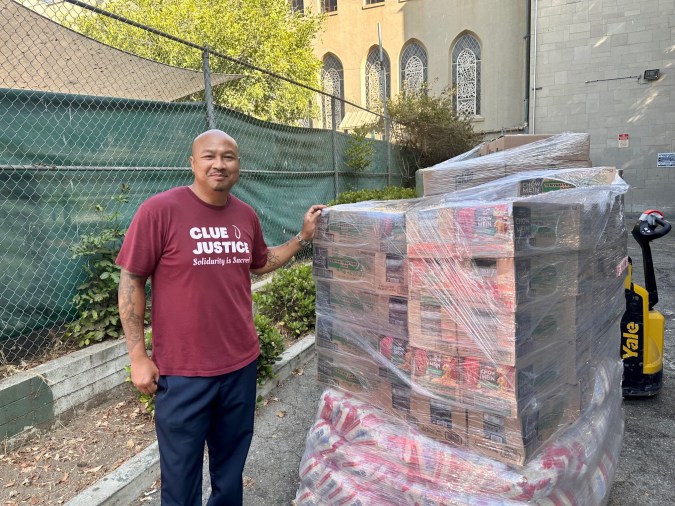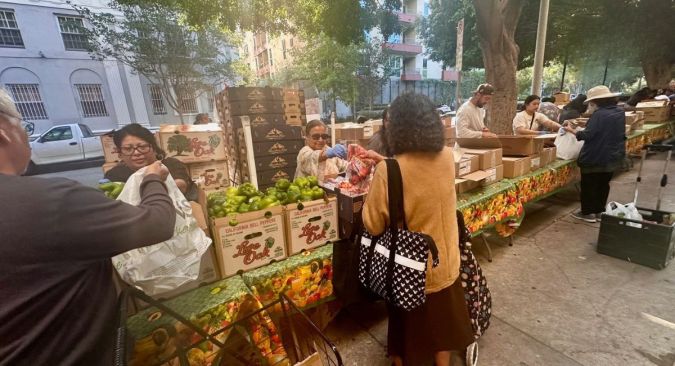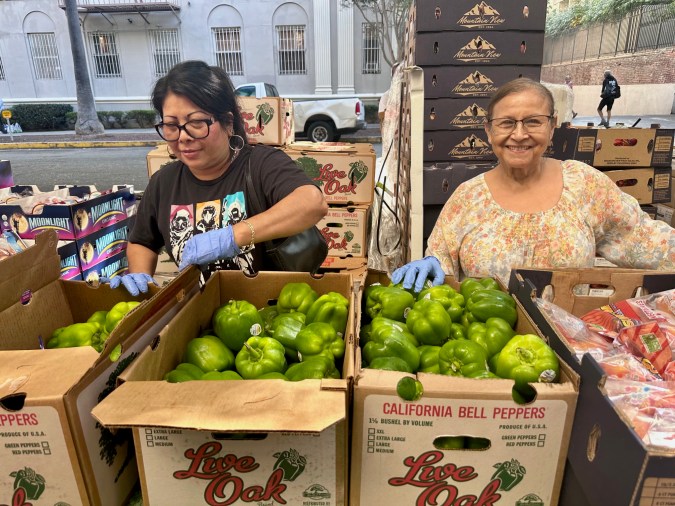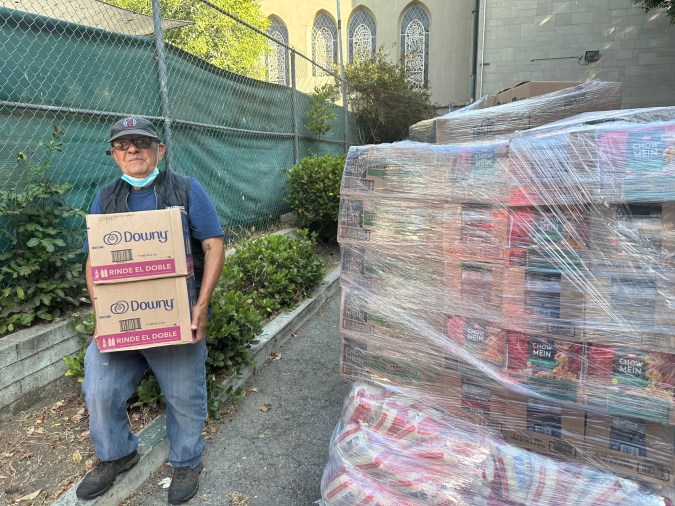For a long time, Genesis Méndez, worked two jobs while studying biology at the Biola University to save to buy a car, and when he finally got it, he decided to use it to bring food to immigrant families who are afraid to go outside.
“Two months ago I started distributing the food. It has been very nice to help people,” he says.
At first the families looked at her suspiciously, but now that they know her when they see her arrive with the food, they get very happy.
“In one of the households where I have food, a girl always comes out with great joy to receive me; and exclaimed exclaims, thank you very much! It’s a blessing!”
Genesis is part of the volunteer group of Clue Justice that delivers food twice a week in their own cars to immigrant families or asylum applicants in the city of Los Angeles.
“I would say that I take food to six to six families twice a week. I like it because they are fresh foods that help them stay healthy.”
Around a well -known church in the Koreatown neighborhood in Los Angeles, long lines of people are formed to receive food that is distributed twice a week.
They are generally members of immigrant families, asylum applicants and people in need.
“Before Trump, they distributed food to between 500 and 800 families on Wednesdays and Fridays, but when the raids began, people stopped coming. The fall was drastic. Barely about 200 and we had a lot Clue Justice.
“Many of these people have members in their family who have been arrested in ICE raids (immigration and customs service).”
This food bag delivery program was born from family phone calls asking if there was no way to give them the groceries in their homes, because they were afraid to leave.
“‘We needed food! My father was arrested and deported,’ they told me. Listening to that broke my heart. We started calling faith leaders and community members to see if we could bring together a group of volunteers to pack food and take it to the houses of those families.”

It was then when Clergy and Laity United for Economic JusticE (Clue Justice), a coalition of congregations of various denominations of faith, organized the food delivery program to those families that could no longer go to church for fear of a migratory raid.
“We managed to collect some 20 volunteers to distribute food bags in homes; and due to the risk of the situation and fear of ICE, some families do not want them to take them to their homes but ask to collect them in certain places where they feel safe to go.”
Food bags include fresh products, vegetables, fruits, canned food, rice, dairy and a great variety. They are food donated by Los Angeles Regional Food Bank.
Bethany Fox, a presbyterian shepherd, has been voluntary for two weeks in the distribution of food to immigrant families.
“With everything that is happening, it is very easy to feel overwhelmed and a little helpless. But I have committed to doing little things to try to facilitate life to those who are having a very bad time.”
He says that Friday is his day off and how he has extra time, he thought that with all the suffering and injustice that is happening, he could take a couple of hours to deliver food.

How do people react when they see you get with food bags. ”
“I think they are grateful. I leave several boxes with food in a place that is like a center in the community and the neighbors go for them. It is as if they were already a bit organized in their own neighborhood. They have friends and contacts and warn each other.”
Since the raids have intensified in Los Angeles and southern California, it is common to observe that in the groups of undocumented immigrants created in social networks, questions about whether they know from somewhere where food donations are made, because they are battleing to buy food are made.
“It is a bit unfair, because we live in a place with so much wealth and so much food that the problem is not that there is not enough. It simply does not be distributed fairly. That is why this is just a way to ensure that those who go hungry, can obtain food and nutrition,” says Pastora Fox.

Many immigrant families have stopped working for fear of being captured in a migratory raid, so their income has decreased.
Vanessa, a mother of five minor children, who is one of the beneficiaries with the delivery of food in Los Angeles, says that after his partner let him go in his job because the company did not want to get into problems with migration, he learned through Instagram that a church was distributing food.
“It has been a blessing and a great help in financial terms. Each piece in the package they send us, helps us. They include proteins such as meat, peanut butter but also cereal, canned food, vegetables and fruits.”

Vanessa states that obviously without these donations of food, they would be having a very bad time.
“Finding a program that offers food deliveries to your home is an advantage. So not having this would make our lives more difficult especially with a newborn. We would probably have to look for other resources and that would expose us.”
Vanessa asked for help to find other groups that help them with diapers for their baby, personal hygiene products and clothing soap.
Bin, the organizer Clue Justice He considers that as a person of faith, feeding those who are hungry is not only important, but essential.
“The Scriptures call us to this:” Because I was hungry, and you gave me eating; I was thirsty, and you gave me drinking; I was an stranger, and you picked me up “(Matthew 25:35, NVI).”
He adds that his supermarket bag delivery program was born from compassion and need. “No family should have to choose between feeding their children and staying safe.”
According to information revealed by the National Security spokeswoman (Homeland Security) between June 6 and August 6, ICE and the Border Patrol (CBP) made 4,163 arrests in the Los Angeles area.
